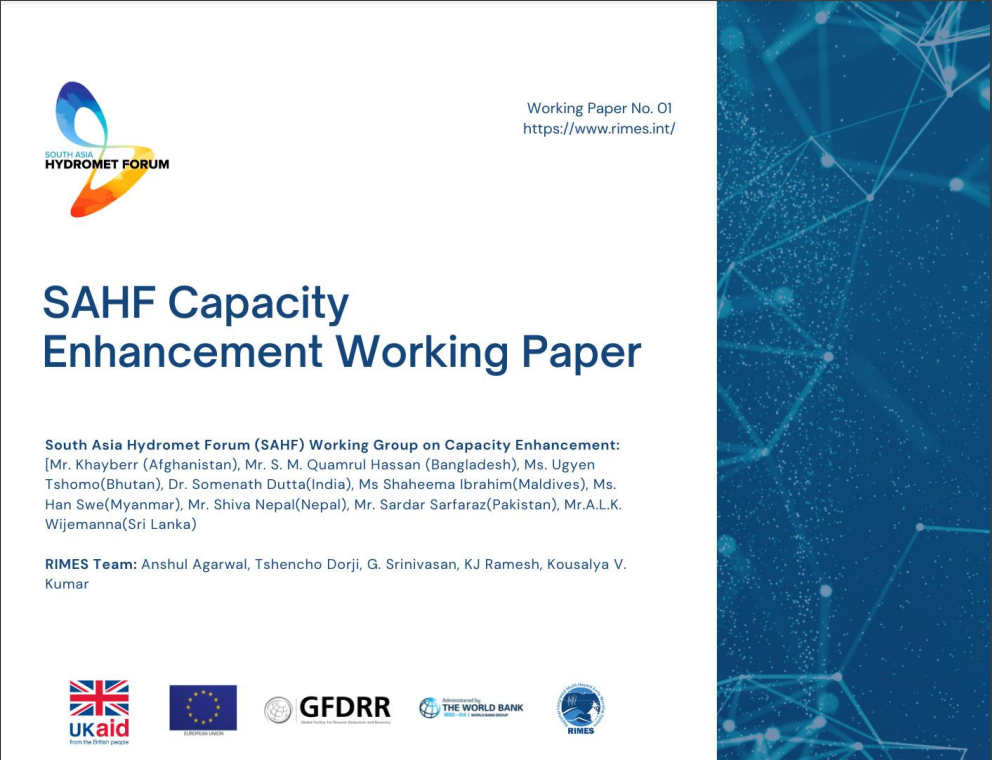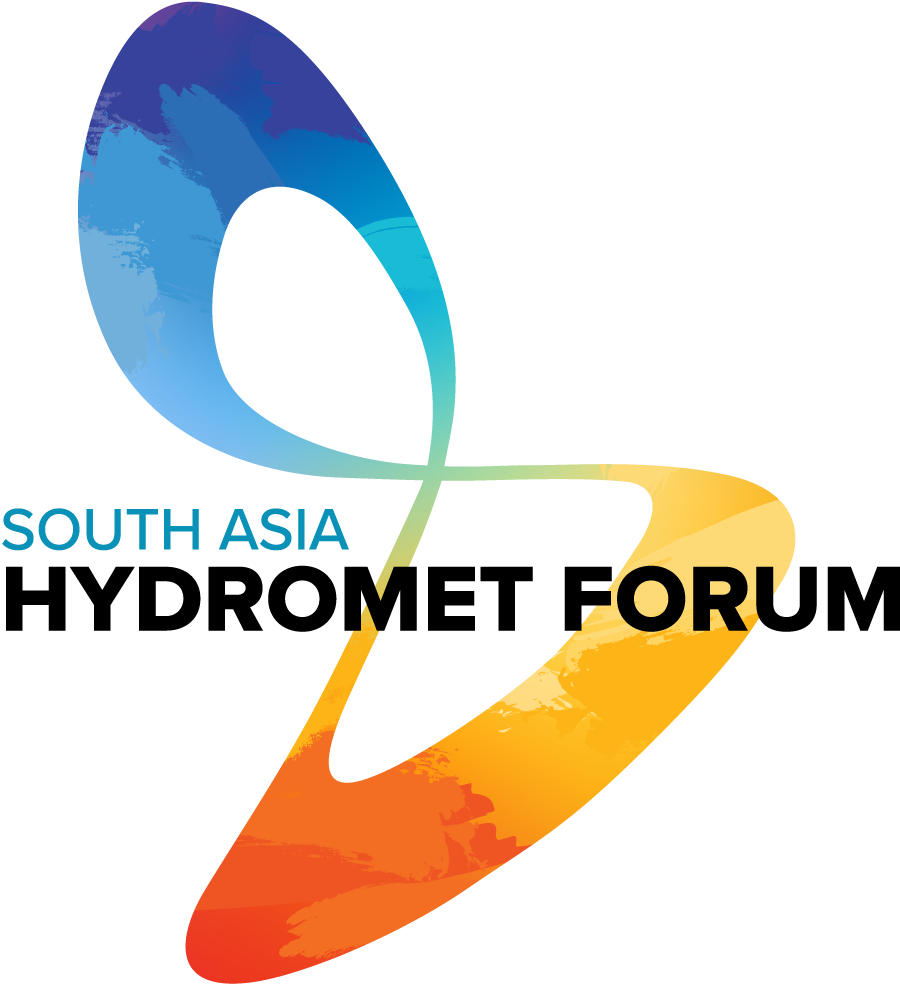SAHF's WOrking Papers (WP)
The SAHF Working Papers (WPs) and the regional approach have been developed to offer a comprehensive and integrated approach to tackle the challenges facing hydro-meteorological services in the region. These papers present a precise and feasible strategy to improve the capabilities of National Meteorological and Hydrological Services in the region and provide a framework for regional collaboration and cooperation. Moreover, they are designed to be adaptable and flexible to meet the changing needs and circumstances of the region.
SAHF WPs and regional approach represent a crucial step towards enhancing the hydro-meteorological services in the region. By presenting a practical and effective framework for cooperation and collaboration, it can support the NMHSs to tackle hydrometeorological challenges effectively.
- Supporting and liaising with key stakeholders for implementation of the program,
- Conducting a regional study to provide recommendations for strengthening elements of hydro-met service value chain.
- Facilitating the development and implementation of capacity building,
- Managing a regional information and communication platform.
SAHF Capacity Enhancement Working Paper
SAHF Numerical Weather Prediction Working Paper
- Setting-up a regionally coordinated training mechanism/coordination hub to build technical and institutional capacity of NMHS in South Asia on Operational Forecasting and Service Delivery through cost-effective and sustainable regional approach through assessments, evaluation, and consultations, to provide recommendations for strengthening key elements of the hydro-met service value chain.
- Facilitate operational cooperation among SAHF NMHS with necessary support from global and regional centers of excellence, to enhance the weather, climate, and hydrological services in South Asia with emerging advancements in forecasting and services to meet the growing demands from the stakeholders.
- Working Groups to conduct a regional study to formulate recommendations for strengthening key elements of the service value chain and develop and implement capacity building activities on forecasting and service delivery with an emphasis on ensemble prediction, impact-based forecasting, advisory services, and business integration.
- The training programs developed as part of the project shall be conducted every year on a continuous basis to build the capacity of forecasters in the region, and thereby their services.
SAHF Impact Based Forecasting Working Paper
- Create conditions that all developing countries could provide a level of service that protects the lives, livelihoods, and economic opportunities of citizens at least as well as the most advanced societies.
- NMHS are in a position to embrace modern approaches to numerical prediction and ensemble predictions.
- NMHS to provide valuable information about the likelihood of an event, and coupled with information on the potential impacts, provide users with warnings of the severity risks.
SAHF Observational Networking Working Paper

- Developing a regional platform
- Learning from each other
- RIMES role in the process
- Meeting the growing demand
- Meeting the growing demand
To develop and implement a regional cooperation activity on behalf of members in South Asia which includes Afghanistan, Bangladesh, Bhutan, India, Maldives, Nepal, Pakistan, and Sri Lanka, of the RIMES Council and to coordinate the SAHF regional capacity development process as well.
The World Bank evolved a Terms of Reference recommended implementing regional program aiming at:
- Supporting and liaising with key stakeholders for implementation of the program,
- Conducting a regional study to provide recommendation for strengthening elements of hydro-met service value chain.
- Facilitating the development and implementation of capacity building,
- Managing a regional information and communication platform.
The regional technical assistance project shall complement and reinforce national activities leading to a more sustainable program of development of meteorological and hydrological services throughout the region. Serving as anchor for the SAHF the process shall foster “learning from each other” and adoption of a futuristic approach for NWP/EPS based national and regional systems that leverage best available global products to develop solutions to the meteorological and hydrological challenges unique to the region.
- Shall set-up a regionally coordinated training mechanism/coordination hub to build technical and institutional capacity of NMHS in South Asia on Operational Forecasting and Service Delivery through cost-effective and sustainable regional approach through assessments, evaluation, and consultations, to provide recommendations for strengthening key elements of the hydro-met service value chain.
- Shall facilitate operational cooperation among SAHF NMHS with necessary support from global and regional centers of excellence, to enhance the weather, climate, and hydrological services in South Asia with emerging advancements in forecasting and services to meet the growing demands from the stakeholders.
- Shall convene Working Groups to conduct a regional study to formulate recommendations for strengthening key elements of the service value chain and develop and implement capacity building activities on forecasting and service delivery with an emphasis on ensemble prediction, impact-based forecasting, advisory services, and business integration.
- The training programs developed as part of the project shall be conducted every year on a continuous basis to build the capacity of forecasters in the region, and thereby their services.
The SAHF regional initiative is to ensure the capacity building activities enabling NMHS to not only address the current demand, but also the growing demand for the next 5-year period. The capacity building initiative shall support the following.
- Create conditions that all developing countries could provide a level of service that protects the lives, livelihoods, and economic opportunities of citizens at least as well as the most advanced societies.
- NMHS are in a position to embrace modern approaches to numerical prediction and ensemble predictions
- NMHS to provide valuable information about the likelihood of an event, and coupled with information on the potential impacts, provide users with warnings of the severity risks
The SAHF regional initiative is to ensure the capacity building activities enabling NMHS to not only address the current demand, but also the growing demand for the next 5-year period. The capacity building initiative shall support the following.
- Create conditions that all developing countries could provide a level of service that protects the lives, livelihoods, and economic opportunities of citizens at least as well as the most advanced societies.
- NMHS are in a position to embrace modern approaches to numerical prediction and ensemble predictions
- NMHS to provide valuable information about the likelihood of an event, and coupled with information on the potential impacts, provide users with warnings of the severity risks



